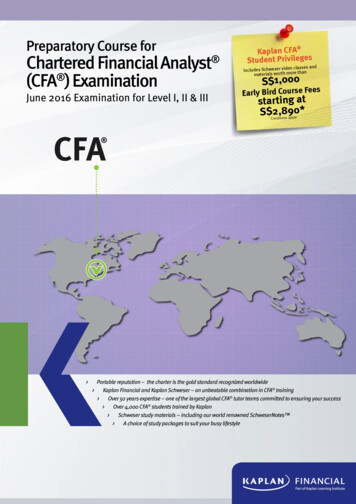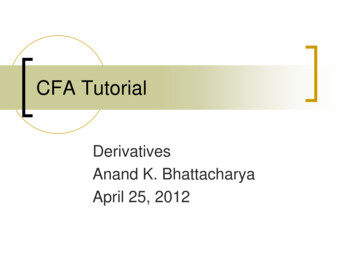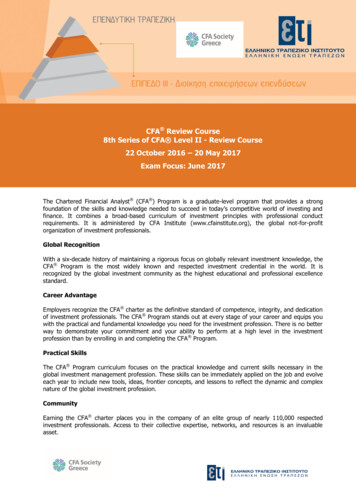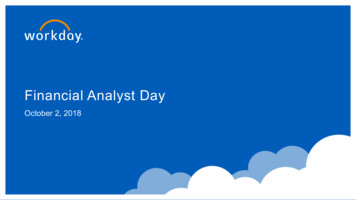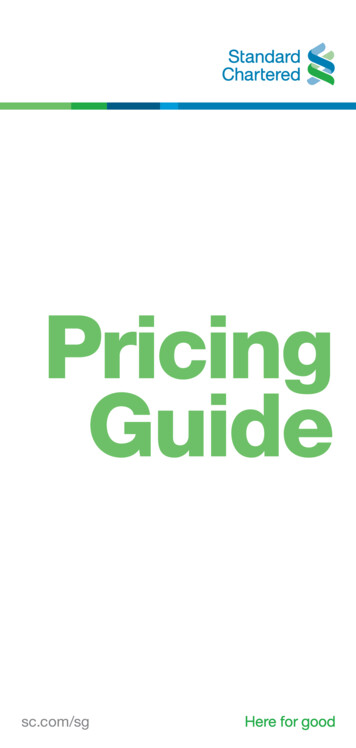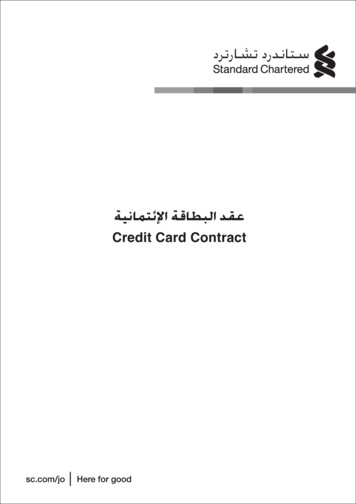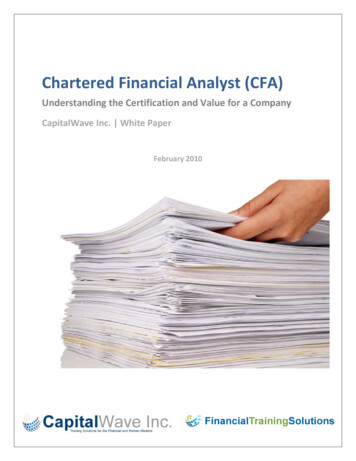
Transcription
Chartered Financial Analyst (CFA)Understanding the Certification and Value for a CompanyCapitalWave Inc. White PaperFebruary 20101
Table of Contents:What Is the CFA Designation? . 3The CFA Curriculum. .4Recognition and Standard .6CFA Competencies . .8Organizational Benefits . .92
What Is the CFA Designation?same level of knowledge and nearly the samelevel of experience. In fact, some of the topfinancial organizations may prefer applicants forvarious positions to have the CFA designation.The CFA designation, or Chartered FinancialAnalyst, is a high‐level certification forprofessionals in the areas of investment andfinancial analysis. The program consists of self‐study, along with three exam levels thatmeasure almost every level of learning.Professionals must also meet criteria for time inthe profession, as well as a high level ofcompetency and ethics. The CFA program,offered by the CFA Institute, is global in itsreach and has been in existence since 1962. Inthe financial world, a CFA designation isconsidered to be among the highest ofprofessional designations. In view of thesecriteria, the CFA designation is beneficial forboth the individual and the organization inseveral ways, including the curriculum, the CFAstandards and recognition, competencies, andin an overall sense at the organizational level.Before we examine each piece, let's discuss inmore detail what the CFA designation means,which professionals hold this designation, andwhat organizations look for CFA designatedcharterholders.In order to begin study for the CFA program, acandidate must meet a minimum level ofexperience, education, and competency in thefield. First, a candidate must have a Bachelor'sdegree or U.S. equivalent, or meet a variety ofwork‐related experience requirements. In otherwords, the candidate without a B.A. must haveat least four years qualified experience in thefield or a combination of education andexperience that equals four years. Internshipsor part‐time assignments do not count towardthe experience levels. In addition, eachcandidate must understand and adhere to verystrict rules of Professional Conduct andCandidate Responsibility, and must re‐certify tothe rules of Professional Conduct on an annualbasis. Although it is not stated as arequirement, a CFA candidate must understandenough English to study the program and takethe exam in that language, as the program isnot available in any other languages.Chartered Financial Analysts own their ownbusinesses and work in highly regarded financialorganizations around the world. The highestconcentration of CFA's is in world‐renownedfinancial organizations such as Deutsche Bank,ABN Amro, and Credit Suisse. Manycharterholders have worked in finance for mostof their professional careers, while some havebeen drawn to finance after a "first" career inanother field. Because the designation is aglobal one, CFA's around the world have theThe question at this point is why is , and consumers? We will discusseach of these aspects during this series, but it'sa good idea to have an overall picture of thebenefits. An individual with the CFA designationhas a highly competitive edge for employmentin the financial industry, not only in his or herown country, but around the world. And in aperiod of financial uncertainty, it may very wellbe that an organization will hold on to its CFA's3
during periods of contraction because they donot want to re‐hire those levels of competencyand experience. Because of the broad based,experiential curriculum, which we will alsodiscuss in the future, a CFA charterholder hasknowledge that is applicable in every daysituations. In addition, because of the networkof CFA charterholders, each individual hasaccess to up‐to‐date information regardingfinancial markets all over the world.At the organizational level, a CFA hire hasalready been held to an extremely high bar interms of experience, education, ethics, andprofessional standard. A hiring manager who islooking at two candidates with equal educationand experience may have an easier choice ifone of the candidates is a CFA because of thislevel of professional standard. As we will seewith the curriculum structure and competencylevels of the program, your organization canbuild its leadership bench with CFAcharterholders. For example, the CFA willprobably have not only technical competencybut also the ethical and leadershipcompetencies that are needed to move yourorganization forward.In terms of the consumer, consider where yourorganization is in regard to customer service. Ifyou are a financial organization whose analystsand investment counselors touch the public,then the CFA designation is a definite plus.Because of the CFA designation's high regard inthe financial world, you can use it as amarketing tool to attract and retain newcustomers. You can point to the trust that theconsumer can have in your CFA's because of thehigh standard of ethics and professionalconduct required of them. You can show clientsthat in today's uncertain financial world, yourorganization is acting in an ethical, above‐the‐board manner because of its preference forprofessionals who hold the CFA designation.As we have mentioned, some of the world's topinvestment banks and financial providerschoose to employ professionals with the CFAdesignation. These CFA's work with the publicand also in internal roles related to investment,analysis, and financial forecasting. So considerthis from the organizational point of view. If youare attempting to topgrade your organizationand benchmark it in relation to the highestperforming financial institutions in the world,then the decision to begin sponsoring for theCFA designation and employing individuals withthe designation will be a good one.In our next article in this series, we will look atthe CFA curriculum in order to show its benefitsfor both the individual and the organization.The CFA CurriculumThe CFA study program encompasses manyareas of the financial industry, as well as astrong emphasis on ethics and professionalresponsibility. As we've discussed briefly, theCFA candidate must pass three exam levels. TheCFA Institute recommends that each candidatespend at least 250 hours in preparation for eachlevel. The curriculum is self‐study, which meansthat the candidate can pace him or herselfaccording to his or her own comfort level.However, as exams are only given on certaindates, the candidate must create the pace to fitwithin those timelines. From the organizationalperspective, the fact that the program is self‐paced is very important. The candidate thatcompletes all three levels successfully will provethat he or she is dedicated, determined, andgoal‐oriented. From an education perspective,we know that any self‐paced program requires4
this dedication and determination, not tomention the discipline to make study a part ofevery day life.The next important aspect of the CFAcurriculum is who determines topic areas, howthose areas are chosen, and who writes thecontent for those topics. First, the curriculumitself changes from year to year due to thechanges that constantly occur on a global scalein the investment world. Major changes areundertaken every five years ‐ and only after adetailed analysis of the practice on a globalscale. In terms of curriculum development, acommittee of active CFA charterholdersdetermines content and the content is thenwritten under their tutelage by the CFI Institutestaff. From a training and developmentperspective, many corporations would love tohave a committee of practicing professionalswho actively look at curriculum to keep it fresh.And because of the changing nature of thefinancial markets, the CFA curriculum must bein constant change, as well. This combination ofpracticing Subject Matter Experts as well asfield analysis make the CFA curriculum strong,current, and in constant change with thefinancial world.The topics that are currently covered in the CFAcurriculum are varied, including ethical andprofessional standards, statistics, analysis,economics, financial reporting, corporatefinance, equity investment, fixed incomesecurities and markets, derivatives, alternativeinvestments, portfolio management, andwealth planning. Because practicing CFA'sdevelop the curriculum, the content tends to beon the practical side, versus more theoreticalknowledge that a person might obtain in auniversity degree program. Plus, the broad‐based, generalist approach allows the CFAcandidate to absorb topics in a way that keepsthem from being too product or market specific.This approach also allows the organization tocreate a talent pool with broad knowledge thatcan be applied in various settings, positions,and projects.The CFA curriculum is broken down intomultiple study sessions within the topic areas.Each of these sessions contains readings fromInstitute content, textbooks, professionaljournals, analyst reports, and case studies,along with problem sets that correlate with thereading and require practical application of theinformation. In addition, each session andreading contains specific learning objectives sothat the candidate can understand what he orshe is going to be expected to do even beforethe lesson begins. The CFA Institute includesmultiple additional resources, such ascomprehensive outlines and indices, as well as aglossary.The exams are almost textbook‐perfectexamples of Bloom's taxonomy in action.Exams, as we've discussed, are given in Juneand December in multiple locations. Each examis broken down into three levels that vary inboth testing method and taxonomy levels. Forexample, Level One exam questions aregenerally multiple‐choice and cover knowledge,comprehension, and some analysis. Level Twoare case‐study questions that cover analysis andapplication, and Level Three are both essay andcase‐based in nature, covering synthesis andintegration. From an adult educationstandpoint, the fact that each exam has threelevels that cover multiple testing methods andtaxonomy levels is impressive. This shows usthat the CFA Institute is dedicated to ensuringthat each CFA leaves the program with not onlyknowledge but the skill necessary to apply that5
knowledge in multiple situations.Recognition and StandardOne of the other benefits from a learningstandpoint is that the exams are given only inEnglish. This may seem tough to some, but theInstitute maintains that this is a method forensuring fairness and accuracy in both deliveryof exam material as well as grading. From aconsistency standpoint, the English‐only examsalso ensure a high level of learning andapplication for candidates.Certifications and professional designationshave a value to the organization and theindividual only if they are recognized orexplainable in terms of the standards theyuphold. In other words, both individual andorganization look for designations that can beused to market, lend credibility, and explainstandards, education and experience. Manyorganizations have internal certification ordesignation programs and these are a great wayto get associates involved and retain them. Butwhat does an internal certification actuallyprove? Everyone inside the organization knowswhat the certification means, what the personhad to do to get it, and what standards he orshe was held to. But outside of thatorganization, what value is the certification toshareholders,customers,orotherorganizations? The CFA designation is wellknown throughout the world, and because of itsstructure, gives your organization and eachindividual the recognition and standard theydeserve. Let's find out how.Before we move on, let's look at the CFAcurriculum and exam structure as it relates toorganizationalbenefits.We'vealreadydetermined that a self‐study curriculumrequires a dedication and discipline that somepeople simply do not possess. But in regard tothe content itself, a CFA candidate will bereceiving the most up‐to‐date content availablesince practitioners compile it. This seems totake the onus off of the organization forensuring that the CFA is consistently up to date.With the network of CFA professionals inaddition to the curriculum, your organizationcan concentrate on training in other functionalor behavioral areas. This is a definite benefit ifyou are planning to build a departmentcomprised of CFA's. Finally, the exam structureensures that each professional has a detailedknowledge ‐ but is able to apply thatknowledge. As organizational developmentprofessionals, we too often see that there is agap between knowledge and execution. In thecase of the CFA, this gap is probably verynarrow.Next, we will move from the curriculum to therecognition and standard of the CFA program asa benefit to both the organization and theindividual.First, The Economist ranked the CFA designationas the "gold standard" in investment analysisdesignations and certifications. This is a weightyaccolade and certainly puts the individual andthe organization at a higher level. But whatother recognition and standard exists to placethe CFA at the "gold standard" level? There areseveral areas, including worldwide regulatoryrecognition, community recognition, standardsrelated to the curriculum, and types ofcompanies that look for CFA charterholders.Regulatory recognition is important inworldwide financial circles, especially if holdersof a designation plan to work in global marketsor in countries other than their own. CFA6
charterholders reside in just about everycountry around the world, according to the CFAInstitute. This is just one piece of therecognition puzzle. Several countries' regulatorybodies have waived some licensing andexamination requirements for candidates whohave passed Levels I or II or have alreadyobtained their CFA designation. This means thatthese charterholders are licensed to practice in
The CFA designation, or Chartered Financial Analyst, is a high‐level certification for professionals in the areas of investment and financial analysis. The program consists of self‐ study, along with three exam levels that measure almost every level of learning.

